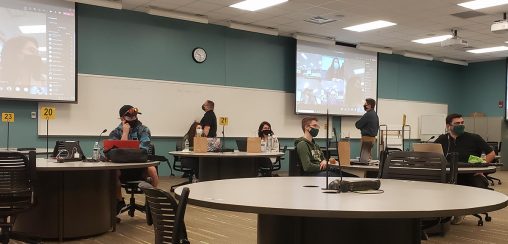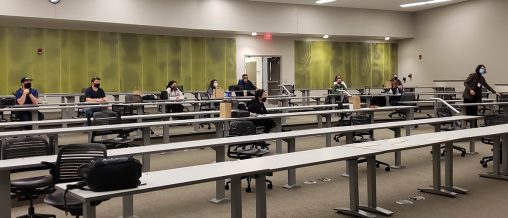
Working in person in the Student Success Center and remotely, students devised solutions to “The Psychology of Connection: From Education to Work to Space” during Innovation Weekend.
By Stephanie Collins, Communications and Events Coordinator, College of Science and Mathematics
An intensive, three-day competition at Wright State University that enables students to come up with solutions to real-world problems produced proposals for virtual reality classrooms and wearable devices to assess mental health.
The fourth annual Innovation Weekend, hosted by the College of Science and Mathematics, was held April 9-11 at the Student Success Center on the Dayton Campus.
A total of eight students from the College of Science and Mathematics, the College of Engineering and Computer Science and the College of Education and Human Services participated in person. Other students joined the event virtually throughout the weekend.
Innovation Weekend is based on a “hackathon” approach to problem-solving that is becoming increasingly common in the private sector. The goal is to encourage and enhance an entrepreneurial and innovative mindset in undergraduate students across diverse majors. It is also designed to foster closer ties with the private sector and expose students to experiences of regional workforce relevance.
This year’s theme was “The Psychology of Connection: From Education to Work to Space.”
One four-student team decided on “The Matrix – Virtual Reality Classrooms,” working to address the current pandemic-related issue of what students and teachers are missing out on by having to work remotely.
The issues included a lack of having real classroom feel, lack of emotional connections and development of social skills, teachers struggling to engage students with video technology, and students struggling to digest and comprehend course material.
The students proposed a virtual reality classroom that could be used in multiple education scenarios, including a classroom that resembled a medieval castle for a class studying medieval history or a classroom that looked like the inside of a human cell for a class studying chemistry.
The benefits would include more direct interaction between teachers and students as well as between students and students, a reduction of distractions, and a better visualization of organs, chemical structures, enzymes and other structures.

Students from the College of Science and Mathematics, the College of Engineering and Computer Science and the College of Education and Human Services participated in Innovation Weekend.
The other four-student team chose “Destressing at the Right Time,” exploring harness wearable device technology to create a system to monitor and assess the mental health of college students. The team proposed using smartwatch technologies to help track stress and send stress-relieving suggestions to the users.
Judges declared the VR classroom team the winner by a hair, largely because there were concerns over medical privacy laws and data collection of personal health information created by the smartwatch proposal.
Members of the in-person teams were Aziz Shadmanov, Ariana Dupre, Sydney Woods, Timothy Farr, Dylan Gunter, Andrea Poole, Ryan Elam and Tina Davis.
Innovation Weekend was sponsored by Leidos.

 Wright State’s spring 2024 commencement ceremonies in photos
Wright State’s spring 2024 commencement ceremonies in photos  Nearly 1,500 students graduate at Wright State’s spring commencement ceremonies
Nearly 1,500 students graduate at Wright State’s spring commencement ceremonies  Wright State University and Premier Health more closely align operations, creating a transformational partnership
Wright State University and Premier Health more closely align operations, creating a transformational partnership  Bottom Line, Wright State partnership aims to increase access to college
Bottom Line, Wright State partnership aims to increase access to college  Wright State’s nursing program celebrates 50th anniversary
Wright State’s nursing program celebrates 50th anniversary 